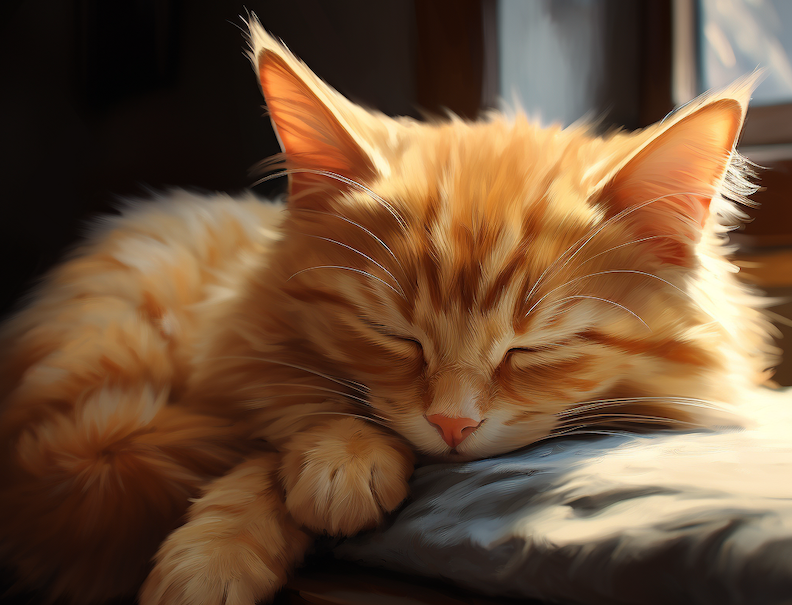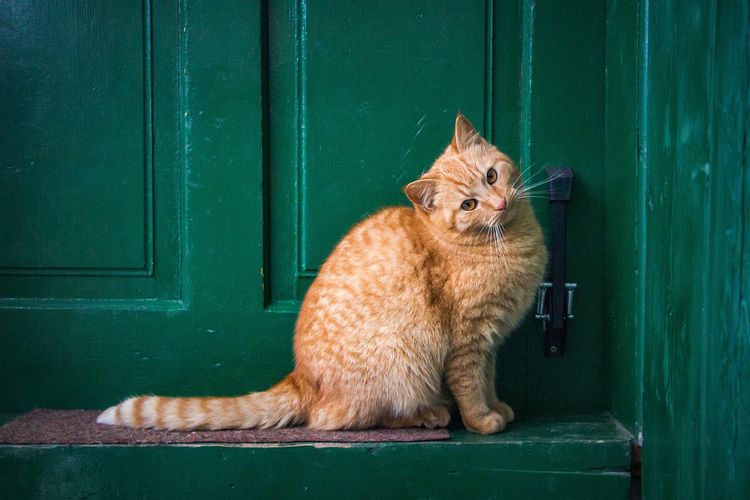The Benefits of Routine for Cats
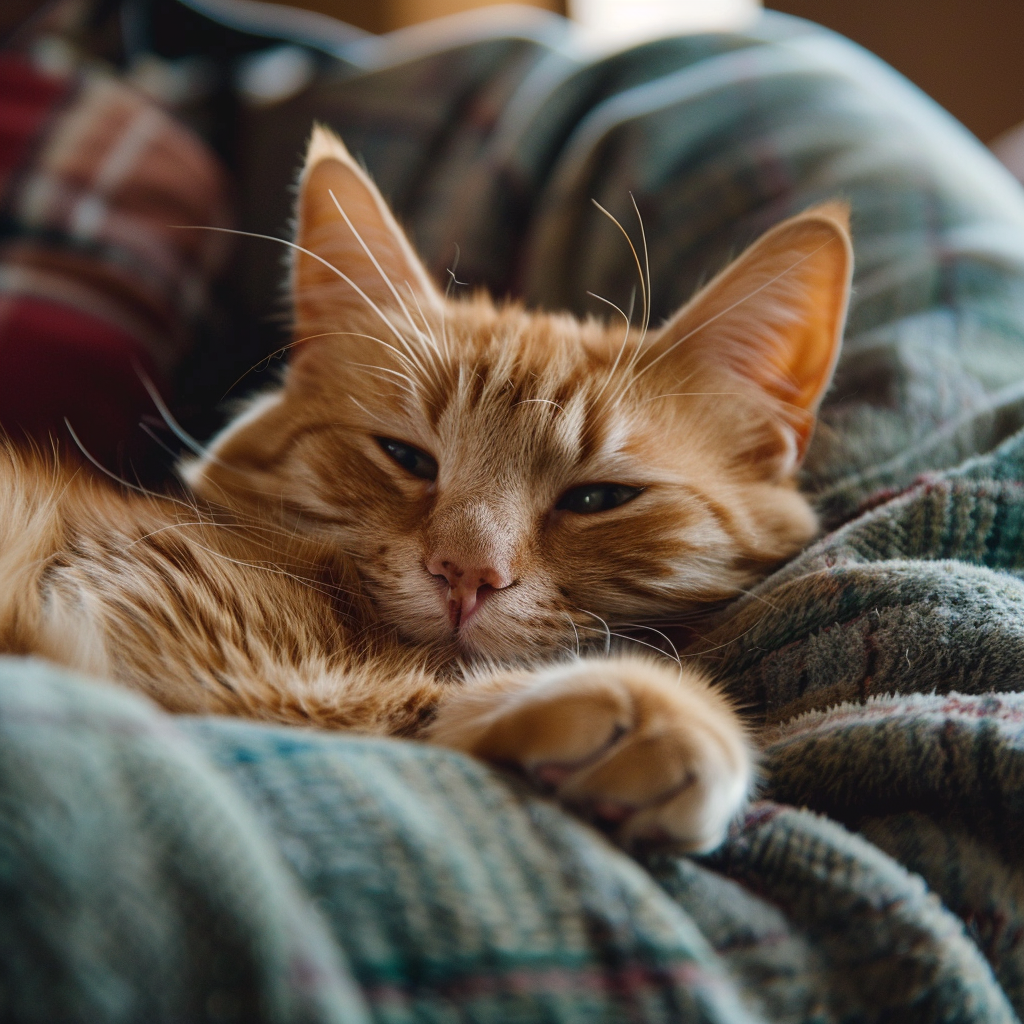
Cats, with their enigmatic personas and independent nature, are often viewed as creatures of comfort and predictability. This innate need for a stable environment underscores the pivotal role routines play in fostering their well-being. Establishing a consistent routine is not just about feeding or playtime at regular intervals; it's about creating a sanctuary of predictability in a world that can often feel chaotic to a sensitive feline. The benefits of such regularity extend far beyond basic care, significantly reducing anxiety and curbing the emergence of behavioral issues that stem from stress. By embedding familiar patterns into their daily lives, we offer cats a framework that mirrors their natural instincts for predictability and control. This introduction to the essentiality of routines unveils how they serve as the cornerstone for a harmonious life, ensuring our feline companions thrive in an environment tailored to their inherent need for structure. Through this exploration, we'll discover that the key to mitigating anxiety and behavioral challenges lies in the simple act of consistency, a principle that can transform the dynamics of cat care and deepen the bond between cats and their caregivers.
The Science of Routine and Cat Behavior
Delving into the core of feline psychology reveals that cats are not just creatures of habit—they are beings whose very survival instincts are wired around predictability and routine. In the wild, their ancestors thrived on the reliability of hunting, eating, and resting patterns, which not only optimized their energy conservation but also heightened their chances of survival. This genetic blueprint remains deeply ingrained in our domestic felines, manifesting in their profound need for a stable and predictable environment.
Routines offer more than just a schedule; they provide a framework that mirrors the natural instincts of cats. For instance, a regular feeding time aligns with their instinctual hunting schedule, offering a sense of accomplishment and satisfaction. Similarly, scheduled playtimes mimic the stalking and pouncing on prey, catering to their predatory instincts while providing mental and physical stimulation.
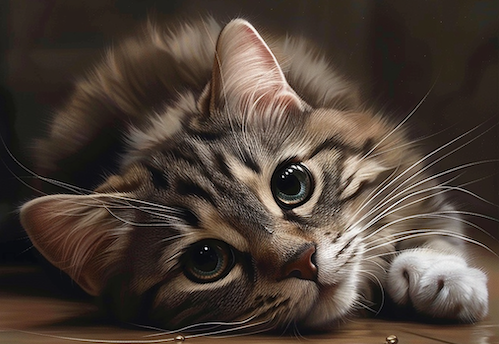
How Routines Reduce Anxiety in Cats
In the nuanced world of feline care, the establishment of a consistent daily routine emerges as a pivotal strategy for minimizing stress and anxiety in cats. This approach, grounded in understanding their need for predictability, plays a crucial role in fostering a serene environment for our furry companions. Routines serve as an anchor in their daily lives, offering a structured framework that can significantly alleviate their inherent anxiety.
One of the most straightforward yet impactful aspects of a routine involves regular feeding times. For cats, knowing when to expect their next meal mirrors the natural certainty of a successful hunt, providing them with a profound sense of security. This predictability in their dietary schedule helps mitigate the stress associated with uncertainty, allowing them to focus on other natural behaviors with ease.
Similarly, dedicated play sessions are more than just entertainment; they are structured outlets for their pent-up energy and predatory instincts. By scheduling these activities at consistent times each day, cats receive mental and physical stimulation in a controlled manner, reducing anxiety by keeping them engaged and fulfilled.
Furthermore, incorporating quiet times into the daily routine is akin to the peaceful lulls in the wild when cats can rest and rejuvenate without fear of predators. These predictable periods of calm allow cats to relax fully, knowing they are safe in their environment, further reducing stress levels.
- Regular Feeding Times: Knowing when to expect their next meal mirrors the certainty of a successful hunt, providing a profound sense of security.
- Scheduled Play Sessions: Structured outlets for pent-up energy and predatory instincts, providing mental and physical stimulation.
- Quiet Times: Predictable periods of calm allow cats to relax fully, knowing they are safe in their environment.
Collectively, these routine elements—feeding, play, and quiet times—work in harmony to create a balanced and anxiety-free atmosphere for cats. By aligning with their natural instincts and providing a predictable structure, we can significantly enhance their quality of life, making every day a peaceful journey in their domestic haven.
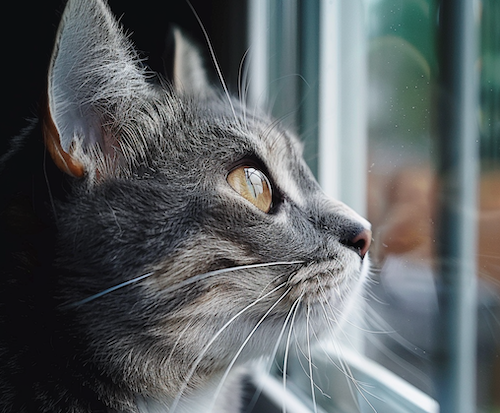
Preventing Behavioral Issues Through Routine
Understanding how daily routines impact cat behavior is crucial for creating a harmonious home. Even small changes in routine can cause stress, leading to various behavioral problems. Here’s how consistent routines can help prevent these issues:
Aggression: Cats can become aggressive when their routines are disrupted, feeling threatened or anxious. Maintaining a consistent schedule for feeding and play reduces these feelings, making cats feel more secure and less likely to act out. Regular play sessions also provide an outlet for their pent-up energy and predatory instincts, further reducing aggressive tendencies.
Inappropriate Elimination: Stress and anxiety from changes in their environment or routine can cause cats to urinate or defecate outside the litter box. Maintaining a stable routine that includes regular litter box cleaning and placement in a quiet, accessible location reassures cats of their safety, significantly decreasing the likelihood of this behavior. Additionally, feeding your cat at consistent times can help regulate their digestive system, making litter box habits more predictable.
Excessive Grooming: Cats often groom themselves excessively as a way to cope with stress. This can lead to hair loss and skin issues. By ensuring consistent daily interactions, feeding times, and play sessions, you can help reduce the stress that leads to excessive grooming. Providing a structured environment where your cat knows what to expect can make them feel more at ease and less inclined to self-soothe through over-grooming.
Destructive Behavior: Cats may scratch furniture, knock over objects, or engage in other destructive behaviors when they are stressed or bored. A consistent routine that includes regular playtime and mental stimulation can help prevent these behaviors. Providing scratching posts, interactive toys, and puzzle feeders can keep your cat engaged and satisfied, reducing the likelihood of destructive actions.
Hiding and Avoidance: Cats may hide or avoid interaction when they feel stressed or insecure. Establishing a predictable routine helps build their confidence and trust in their environment. Consistent feeding, play, and quiet times create a sense of normalcy and safety, encouraging your cat to be more social and less prone to hiding.
Key Routine Elements to Remember:
- Feeding and Play: Maintain a consistent schedule to reduce aggression, provide a sense of security, and regulate digestive health.
- Litter Box Care: Clean regularly and place in a quiet, accessible location to prevent inappropriate elimination.
- Daily Interactions: Ensure consistent interaction, feeding, and playtimes to alleviate excessive grooming and destructive behavior.
- Mental Stimulation: Provide interactive toys and puzzle feeders to keep your cat engaged and prevent boredom-related behaviors.
Consistent routines help cats feel in control of their environment, reducing stress and reinforcing a sense of safety. This predictability lowers anxiety levels, leading to a more balanced and content cat.
By understanding and implementing these consistent routines, cat owners can prevent behavioral issues and ensure their cats thrive in a stable, predictable, and nurturing environment. This approach highlights the importance of routine in cat care, making it an essential component of a cat's psychological well-being.
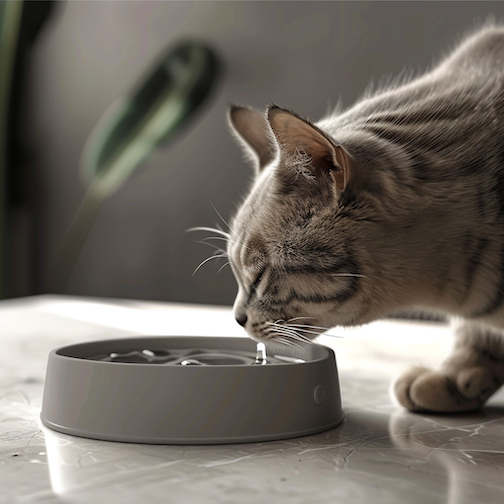
Key Elements of a Healthy Routine for Cats
A well-structured routine is the backbone of a cat's mental and physical health. Central to this routine are activities that cater to their basic needs while providing stability and enrichment. Here are the core components that should be consistently integrated into your cat's daily life.
Feeding: Regular feeding times not only help in managing your cat's diet and weight but also instill a sense of security. Consistent meal times aligned with their natural predatory cycles can prevent stress and support digestive health.
Play and Exercise: Scheduled play sessions fulfill a cat's instinctual need to hunt and explore, vital for their mental stimulation and physical fitness. Engaging in interactive play daily ensures they remain active and mentally sharp, warding off boredom-induced behaviors.
Grooming: While cats are naturally inclined to groom themselves, integrating grooming into their routine strengthens your bond and aids in early detection of skin issues or parasites. Consistent grooming sessions help cats feel cared for and maintain their coat's health.
Sleep: Cats require plenty of rest, with sleep patterns that often mirror the safety and tranquility of their environment. Establishing quiet, undisturbed areas for sleep supports their natural circadian rhythms, contributing to overall well-being.
Ensuring these elements are consistently present in your cat's routine is paramount. Regularity in feeding, play, grooming, and sleep creates a framework of predictability, reducing anxiety and fostering a stable, healthy environment for your feline friend. This structured approach to their daily activities not only meets their physical needs but also nurtures their emotional health, cultivating a balanced, content cat.
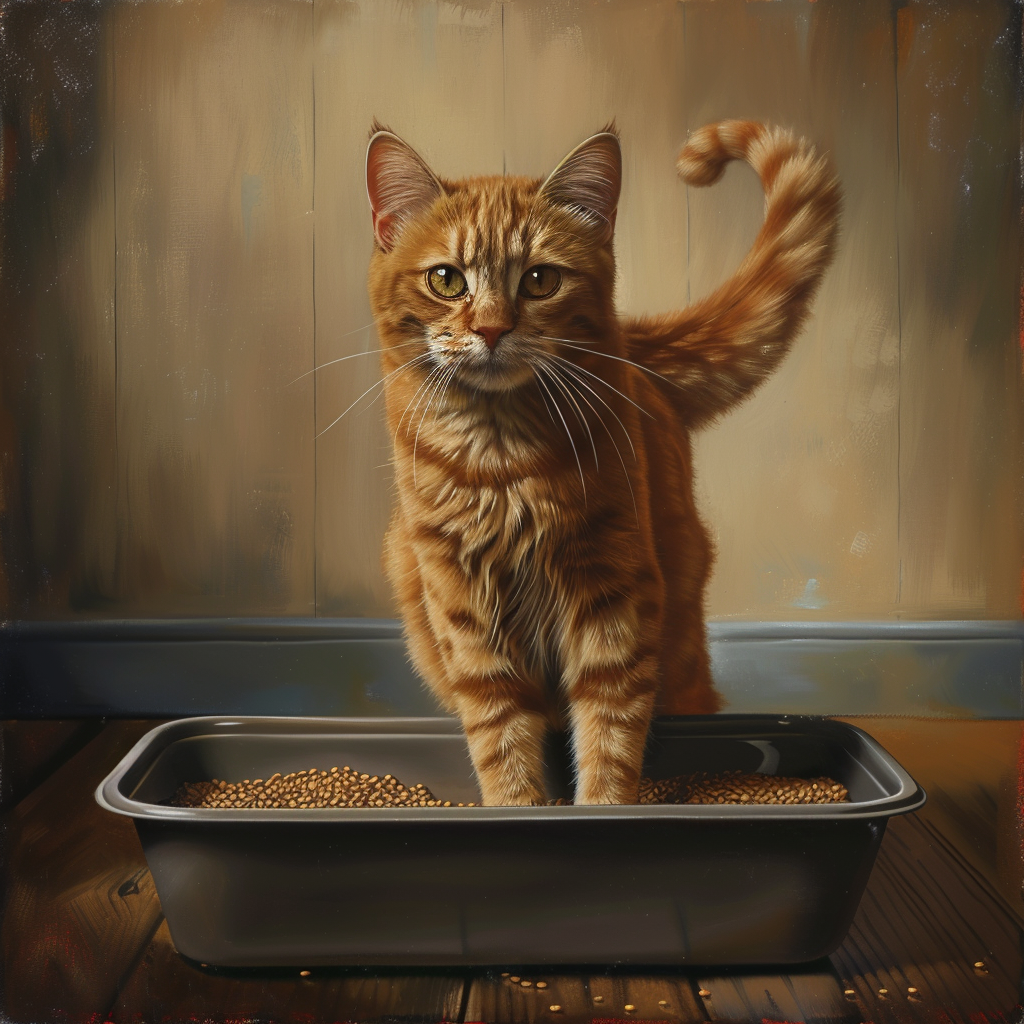
Implementing and Maintaining Routines for Cats
Creating a routine that fits both your cat’s natural habits and your daily schedule is crucial for their well-being. Here’s how to establish and maintain a consistent routine:
- Observe Your Cat: Start by noticing when your cat naturally prefers to play, rest, and eat. Align these activities with times when you’re usually available to engage or supervise.
- Consistency is Key: Try to keep these activities at the same times each day. Consistent schedules help your cat adjust more quickly and feel secure.
- Gradual Changes: If you need to introduce new elements or adjust the routine, do it gradually. For example, if you need to change feeding or playtime due to work commitments, shift the schedule in small increments over several days. This minimizes stress and helps your cat adapt without feeling overwhelmed.
- Stable Environment: The goal is to create a predictable and stable environment for your cat. This routine should meet their needs while fitting into your lifestyle.
- Patience and Consistency: Be patient and consistent in maintaining the routine. Over time, this will ensure your cat remains healthy, happy, and well-adjusted.
By following these steps, you can establish a routine that benefits both you and your cat, creating a harmonious living environment.
Product Suggestions for Establishing Routines for Your Cat
Incorporating the right products into your cat's daily routine can make a significant difference in their overall well-being. Here are some product suggestions to help you establish and maintain effective routines for feeding, play, grooming, sleep, mental stimulation, and litter box care:
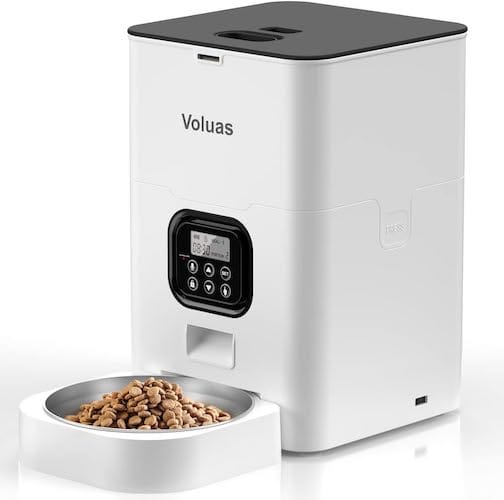
VOLUAS Automatic Cat Feeder
- Scheduled Feeding: Allows you to set up to 4 meals per day, ensuring your cat gets fed at regular intervals even when you're not home.
- Customizable Portions: Each meal can be portioned from 2 teaspoons to 4.5 cups, helping you manage your cat's diet and prevent overeating.
- Voice Recording: Includes a 10-second voice recording feature to call your cat to their meals, making feeding time feel more familiar and comforting.
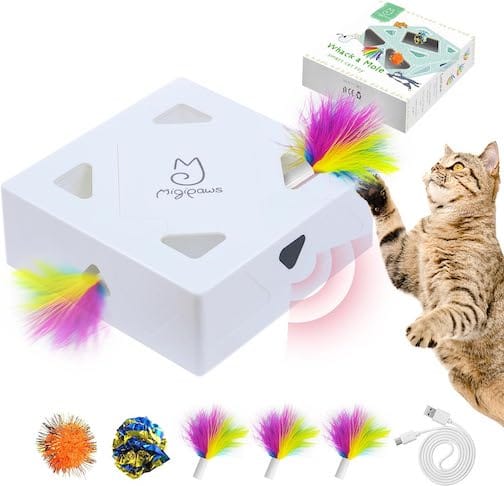
Migipaws Cat Toys, Interactive Automatic 7 Holes Mice Whack-A-Mole (Motion Detection)
- Interactive Play: Simulates the classic whack-a-mole game with mice popping out of 7 holes, engaging your cat’s hunting instincts and keeping them entertained.
- Motion Detection: Equipped with motion sensors to detect your cat's presence, activating the toy to start the game and encouraging spontaneous play.
- Automatic Shutoff: Includes an automatic shutoff feature to conserve battery life, turning off after a period of inactivity.
(This is one of my cat's personal favorites)
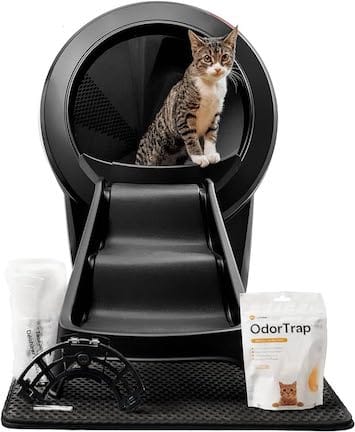
Litter-Robot 4 Bundle by Whisker, Black - Automatic, Self-Cleaning Cat Litter Box
- Automatic Self-Cleaning: The Litter-Robot 4 automatically sifts waste from clean litter after each use, ensuring a clean litter box every time without the need for manual scooping.
- Odor Control: Features an advanced odor management system with a carbon filter to reduce unpleasant smells, keeping your home smelling fresh.
- Spacious and Comfortable: Designed with a larger entryway and spacious interior to accommodate cats of all sizes, providing a comfortable and stress-free litter box experience.
- WiFi-Enabled: Connects to the Whisker app, allowing you to monitor litter box usage, receive notifications, and manage settings remotely from your smartphone.
By incorporating these carefully selected products into your cat's daily routine, you can create a stable, predictable, and enriching environment that significantly enhances their well-being. Consistent routines not only reduce stress and anxiety but also prevent behavioral issues, ensuring your feline companion enjoys a happy, healthy, and fulfilling life. Embrace the power of routine to deepen your bond and provide the best care for your cat.
Final Thoughts,
This blog has illuminated the profound impact of a consistent routine on a cat's life, highlighting the essentials of feeding, play, grooming, and sleep. By fostering an environment of predictability, we can significantly reduce anxiety and prevent behavioral issues, ensuring our feline companions enjoy a tranquil, content existence. Embrace routine as the cornerstone of your cat's well-being, nurturing a happy, healthy relationship that thrives on stability and love.
Frequently Asked Questions
Why is a consistent routine important for my cat?
A consistent routine provides predictability, which reduces stress and anxiety in cats. It aligns with their natural instincts for predictability and control, helping them feel secure and reducing the likelihood of behavioral issues.
How do I start establishing a routine for my cat?
Begin by observing your cat's natural habits, such as when they prefer to eat, play, and rest. Align these activities with times when you can engage or supervise them. Consistency is key, so try to maintain these activities at similar times each day.
What should I do if my schedule changes?
If you need to adjust your cat's routine due to changes in your schedule, do so gradually. Shift feeding or playtimes in small increments over several days to help your cat adapt without feeling overwhelmed.
How can I ensure my cat gets enough mental stimulation?
Provide interactive toys and puzzle feeders to keep your cat engaged. Regular play sessions that mimic hunting behavior are also essential for their mental and physical stimulation.
What if my cat shows signs of stress or behavioral issues despite having a routine?
If your cat continues to show signs of stress or behavioral issues, consult with a veterinarian or a cat behaviorist. They can help identify any underlying issues and provide additional strategies to improve your cat's well-being.
How often should I groom my cat?
Regular grooming is important for your cat's health. Depending on your cat's coat type, you may need to groom them daily or a few times a week. Consistent grooming sessions help maintain their coat's health and strengthen your bond.
